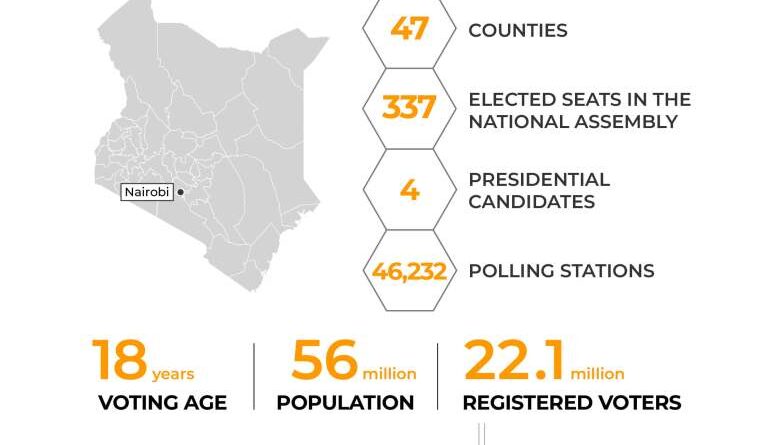
Official partial results show the vice president slightly ahead in Kenya’s presidential vote.
Deputy President William Ruto edged ahead of his main rival, Raila Odinga, in Kenya’s presidential election as the country remained on hold for the final outcome of the election.
Ruto won 51.25 percent of the vote on Sunday, reversing Odinga’s earlier gains of 48.09 percent, according to figures from the Independent Electoral and Boundaries Commission (IEBC), which tallied the results of almost 50 percent of the constituencies.
The election, which was held on Tuesday, is being watched closely as a test of stability in Kenya, which is one of East Africa’s wealthiest nations and its most vibrant democracy.
Previous votes in the country have been marred by rigging and deadly violence.
The electoral commission has until Tuesday to declare a winner. The winning candidate must receive 50 percent of the national vote plus one, and at least 25 percent of the vote from 24 of 47 counties.
With the race so close, observers say a Supreme Court appeal by the losing candidate is all but certain, meaning it could be many weeks before a new president takes office.
In western Kenya, residents said they were tired of waiting for results, but stressed they were also worn down by the turmoil of the past.
“We are not ready for any violence here,” said Ezekiel Kibet, 40, who said he would accept the results if the process is transparent. “We’re thinking about how our kids are going to go back to school.”
“Let whoever wins rule us,” added 63-year-old Daniel Arap Chepkwony. “A lot of people think we’re going to come out with our guns here, but we’re not going to.”
‘Crime Scene’
Odinga and Ruto are in a tight race to succeed President Uhuru Kenyatta, who has reached his two-term limit. Kenyatta has backed Odinga after falling out with Ruto after the last election.
Riot police responded to fighting Saturday afternoon at the national counting center amid tensions over the closed results. An Odinga agent announced from the lectern that the tallying center was a “crime scene” before calm was restored.
The agent, Saitabao Ole Kanchory, offered no evidence in the latest example of unverified claims being made by both major campaigns as Kenya awaits official results.
Police remained in the center on Sunday.
“We must all avoid escalating tensions that could easily spark violence,” local human rights groups and professional associations said in a joint statement, calling for restraint from the candidates and their supporters.
Official vote counting has been progressing slowly, increasing public anxiety.
IEBC chairman Wafula Chebukati blamed the party’s agents, who are allowed to scrutinize the result forms before adding them to the final tally.
“The officers in this exercise cannot continue … as if we were conducting a forensic audit,” he said at a news conference on Friday. “We are not going as fast as we should. This exercise must be concluded as soon as possible.”
Representatives of Odinga’s and Ruto’s coalitions did not immediately respond to requests for comment.
The two front-runners have vowed to ensure calm after the result is known, with Kenyans still haunted by the deadly violence that followed the 2017 and 2007 polls.
More than 1,200 people were killed after the disputed 2007 election and more than 100 were killed after the 2017 election.
With the aim of being transparent, the electoral commission – which has faced stinging criticism for its management of the annulled votes of August 2017 – has been uploading documents on its website with the results of each col electoral law
Turnout fell sharply in those elections, to 65 percent, as some Kenyans expressed weariness at seeing long-known political leaders at the polls and frustration over economic issues such as widespread corruption and price increase
[ad_2]
Source link





